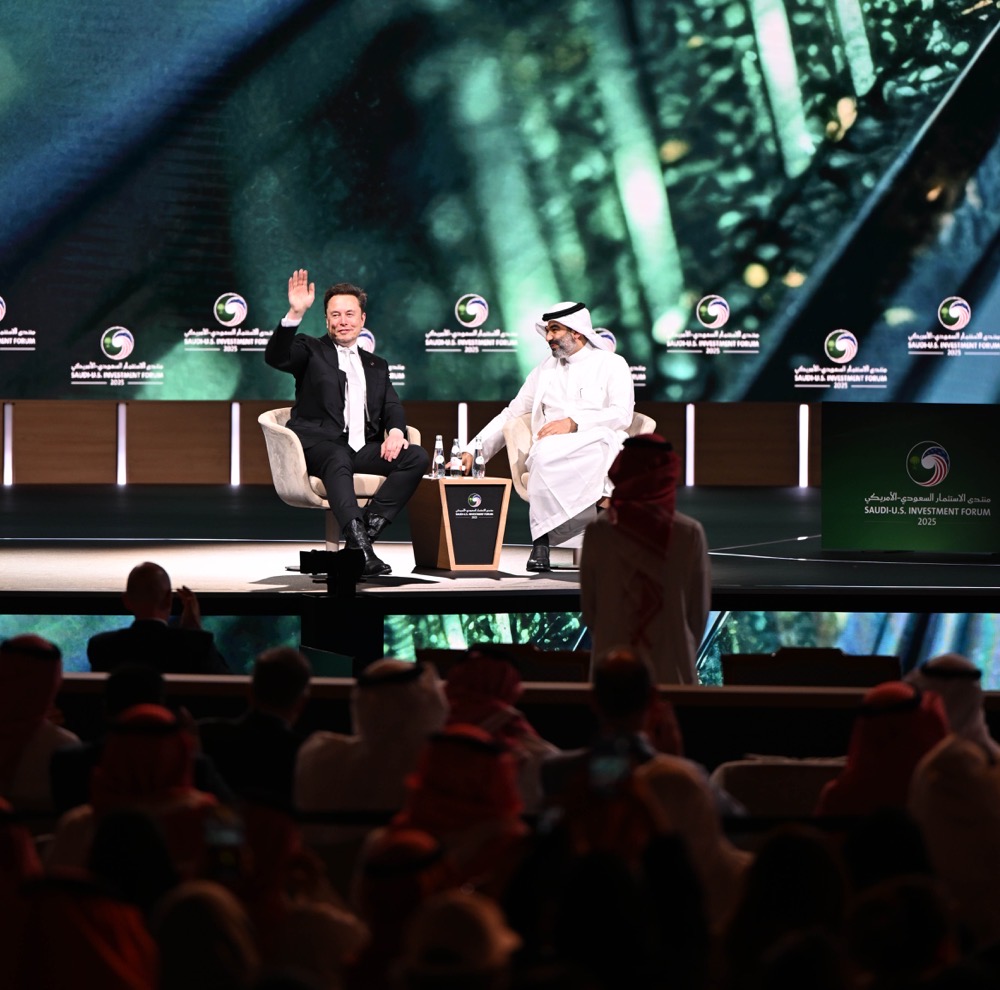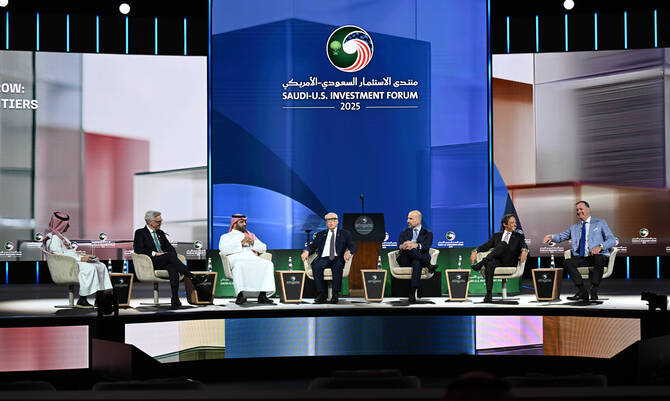RIYADH: It is just over 10 years since the Uber smartphone-based car-hailing service launched in Riyadh. Since then, it has expanded to other cities in the Kingdom and, as Uber CEO Dara Khosrowshahi told a panel at the Saudi-US Investment Forum in Riyadh, Saudi Arabia is now one of the company’s fastest growing markets.
There are now 140,000 Saudi nationals driving on the platform, serving 4 million riders in 20 cities across the Kingdom.
Now, said Khosrowshahi, the company was poised to take the next technological step — and, he predicted, autonomous vehicles will soon be seen on the streets of the Kingdom.
“You will see autonomous vehicles in Saudi Arabia this year,” Khosrowshahi told the panel on Tuesday. “It's something that we are very focused on.”

US President Donald Trump views plans for Saudi Arabia’s Diriyah during his state visit. (AFP)
He said the vehicles would be much safer for both passengers and other road users.
“Autonomous (technology) holds incredible potential for us,” he added. “First of all, it represents a safer street, as the autonomous driver isn’t distracted, isn’t going be texting while they’re driving, etc. And it’s a driver that continues to learn from all the experience of all the miles driven all over the world.”
Ultimately, he added, “autonomous will not only be safer, but will also be a cheaper form of transportation.” Uber is “now working with 18 autonomous partners … to make sure that autonomous technology is introduced in a safe manner.”
Another session at the forum, moderated by Arab News Editor-in-Chief Faisal J. Abbas, focused on the giga-projects that are raising the Kingdom’s profile around the world and writing the next chapter in the story of national transformation.

The Mukaab, a cubed skyscraper being develop in downtown Riyadh. (New Murabba)
The transformation of Diriyah, the birthplace of Saudi Arabia, into a globally important cultural, historical and leisure destination, is one of the projects that is helping to drive the modernization and diversification envisaged by Vision 2030.
Jerry Inzerillo, CEO of Diriyah Company, spoke about the importance of preserving the Kingdom’s history and the ancestral home of Al-Saud, including the royal At-Turaif district, considered the birthplace of the First Saudi State in 1727 and which is a UNESCO World Heritage Site since 2010.
Today, Diriyah is the scene of one of Saudi Arabia’s largest giga-projects, a $63.2 billion transformation of the 14-square-kilometer site of the historic town into a global heritage, cultural and lifestyle destination.
Stating that the project is running on schedule and within budget, Inzerillo added: “We just welcomed to the UNESCO World Heritage site this week our three millionth visitor. We have 45,000 workers currently working in the project. We are very honored and pleased to say that right now we’re doing business with 83 American companies.”
Michael Dyke, CEO of the New Murabba development in Riyadh, said the Mukaab, the vast cube-shaped building at its heart, would be one of the world’s top iconic buildings.

Saudi Housing Minister Majed Al-Hogail, left, and Saudi Minister of Tourism Ahmed Al-Khateeb, centre, talk with Arab News Editor in Chief Faisal J. Abbas. (AN Photo/Basheer Saleh)
“It is one of the greatest, largest structures ever known,” Dyke said, comparing it to the MSG Sphere in Las Vegas. That, said Dyke, seats almost 18,000 people; the Mukaab will be 22 times larger.
“When people enter the Mukaab, they will enter another world, there will be holograms and there will be strong AI driving through the whole of the facility.”
The Mukaab will come online from 2030 onward, and “when people come to Riyadh they will see something new, something different. It will be another fantastic place that will complement the amazing projects already happening in the Kingdom.”
FASTFACTS
• Uber CEO Dara Khosrowshahi said autonomous vehicles would be much safer both for the passengers and other road users.
• New Murabba CEO Michael Dyke said the Mukaab would be one of the world’s iconic buildings.
Another massive project being created as part of the Kingdom’s development is NEOM — the vast city on the Red Sea coast that has already fired imaginations around the world.
Rayan Fayez, Deputy CEO of NEOM, said the 26,500 square kilometer project would be the size of Massachusetts.
“Building a city and a region of this scale, requires significant infrastructure,” Fayez said.

Tesla and SpaceX boss Elon Musk with Saudi Minister of Communications & IT Abdullah Alswaha. (AN Photo/Basheer Saleh)
“When we talk about some of the themes that we are spending our time and effort on, infrastructure is a big one. So, whether it is digital infrastructure, 500 kilometers of fiber has already been laid, a data center being built, power and utility infrastructure already has solar, and wind farms up.
“In addition to 194 kilometers of water pipeline, food infrastructure (such as) greenhouses are being developed, because NEOM is not just a real-estate development initiative, it’s an economy building.”
NEOM is, he added, “a joint venture between Neom Aqua Power and Air products, which is, of course, a US company with a significant investment coming into Neom, developing what will become the Green Hydrogen Project.”

US President Donald Trump and Saudi Crown Prince Mohammed bin Salman visit Diriyah. (AFP)
When Saudi Arabia’s Vision 2030 comes to fruition, in just five years from now, tourism will be as important for the Kingdom’s economy as oil is today.
That was the prediction of Ahmed Al-Khateeb, the minister of tourism, during a panel at the Saudi–US Investment Forum.
It was, Al-Khateeb added, a measure of how far the country’s tourism sector has come since the launch in 2016 of Vision 2030, the blueprint for reducing the dependence on oil and diversifying the economy, that Saudi Arabia is increasingly seen around the world as a land of green mountains, stunning Red Sea islands and a welcoming, hospitable culture.
Opinion
This section contains relevant reference points, placed in (Opinion field)
The tourism and hospitality sectors have experienced a significant increase in visitors, rising from 50 million domestic and international tourists in 2019 to 115 million in 2024, surpassing the ambitious target of 100 million tourists that was set for the industry under Vision 2030.
In 2024, Al-Khateeb added, with 30 million international visitors among its 115 million tourists, Saudi Arabia was one of the 10 most visited countries in the world.

The Line, a new mega city currently under construction in Neom. (Neom)
"I’m excited,” Al-Khateeb said. “We are full of energy to build this new sector to unlock the potential we have in our great country and to share the beautiful culture with the visitors coming from all around the world.
"By 2030, the tourism sector will be next to the oil as the highest contributor to our economy," he added.
For decades, oil production accounted for 85 to 90 percent of Saudi Arabia’s GDP, but since 2016 significant changes have occurred and oil now accounts for less than 55 percent of GDP.
Since 2019, the Kingdom has opened its borders to nearly 65 countries, issuing electronic visas for those visiting its natural and manmade tourist attractions, from the spectacular mountains of Asir in southern Saudi Arabia to the ancient mysteries of AlUla in the north.

Arab News Editor-in-Chief Faisal J. Abbas moderated a session on the giga-projects in the Kingdom. (AFP)
In Riyadh, he added, tourists can find a wide choice of sports, cultural and adventure attractions, and there is still more to see in the Red Sea and experience in the two holy cities of Makkah and Madinah.
Al-Khateeb emphasized that a well-educated, vibrant young Saudi population is essential for the growth of the tourism sector, which has increased its workforce share from 2 percent to 7 percent in less than a decade.
The ministry aims to welcome 50 million international tourists by 2030, placing the Kingdom among the top five most visited countries, he said. It also plans to increase the sector's GDP contribution from the current 5 percent to 10 percent by that same year.
"We have created (a tourism) sector that will satisfy the different travelers from different segments who are coming for business or leisure and entertainment, or people who are coming for religious purposes to visit the two holy cities," Al-Khateeb said.

Business leaders gathered in the Saudi capital on Tuesday for the Saudi-US Investment Forum. (AN Photo/Basheer Saleh)
In discussing the US-Saudi partnership, the minister noted that the tourism sector had adopted best practices from the US, a leading global country in the industry, including conferences, entertainment and air-travel services.
"We are working closely with our friends and partners in the US. We are sending young Saudis to get the best education in the US and the best vocational training (in tourism)," he added.


















